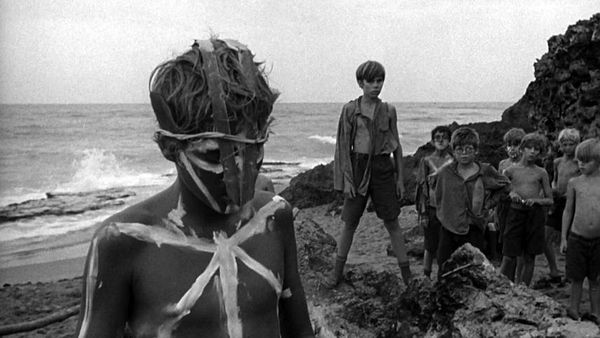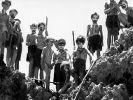Eye For Film >> Movies >> Lord Of The Flies (1963) Film Review

In opening, a personal note: Lord Of The Flies is the first film that I can ever recall reviewing, three decades ago. It was four years before I turned professional; I was, appropriately enough, still at school. Returning to it now is therefore a rather different experience from most of what I do as a critic. I first related to it as something that reflected very closely what I saw around me. Time has changed not only my perspective but also the way that it fits into the world.
Lord Of The Flies is, in essence, a primal myth. For those unfamiliar with the plot, it follows a group of English public school boys shipwrecked on a topical island. Ralph (James Aubrey) seems like a natural leader - he's smart, fair, and good at planning, able to think not only about the immediate needs of the group but about the bigger picture, the importance of rescue. There's a rival on the island, however, and that's Jack (Tom Chapin), who quickly wins the loyalty of many of the boys with his focus on hunting, feasting and dancing. Complicating the picture are the asthmatic and socially unskilled Piggy (Hugh Edwards), natural second in command Roger (Roger Elwin), and thoughtful outsider Simon (Tom Gaman). Despite the fact that, between them, they have the skills they need to get by pretty comfortably in the short-to-medium term, the stage is set for conflict

Though it sticks very closely to William Golding's book, published nine years earlier, the tone of the film is different, reflecting cultural changes that had taken place during that time. The notion of childhood innocence was beginning to fade from the public consciousness, and has faded further since. Attitudes to the military and to authority in general had begun to shift, largely due to continuing conversations in the aftermath of the World Wars. Consequently, the boys' descent into savagery feels less like a comment on childhood; in its place, the metaphor that Golding touched on at the very end of his book resonates more strongly, with the children, unattended coming to resemble adults.
Widely regarded as a classic today, the film was made on a shoestring budget with an amateur cast mostly selected for their accents (as production was based in America). Aubrey, who went on to have a professional acting career, is very good in the lead, and by and large Brook manages to elicit impressive performances from all the boys. The naturalness of these, and the very real sense of energy and play in the more exuberant scenes, really brings the film to life. The one weak note is Edwards as Piggy: he looks the part (despite not being fat by today's standards) and his physical acting is good, but his delivery (even in the one scene where sound was recorded directly) is terribly stilted - he's like Piggy's idea of what an impressive Piggy would sound like. It's unfortunate given the pivotal function of his character.
The film is of historical interest for a number of reasons, not least the fact that it is one of the first to use a form of steadicam, the only option given some of the terrain. Technical innovations abound, and Brook's techniques as a director also push the envelope. Rather than trying to film the scenes of conflict that frame the children's situation, or the scenes in which they slaughter pigs, he uses still images which only hint at the worst of the violence, but lets us hear it. This has far more impact than the more explicit approach one would expect today, and it stood out stylistically in its time. It helps the viewer to connect with the surreal atmosphere of the island, and thus with the boys' sense of disconnection from wider society and its tiresome rules. It would be several more decades before psychologists would codify the way that time and space seem to shrink in such circumstances, removing familiar inhibitions against violence, but Brook seems acutely aware of that phenomenon.
For all that time has changed the way it fits into the world, Lord Of The Flies remains as important today as it was in 1963. The quality of the restored version is excellent. Don't wait too long to see it.
Reviewed on: 29 Aug 2017

















